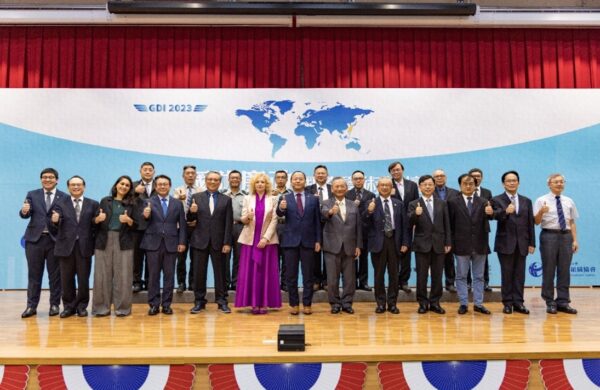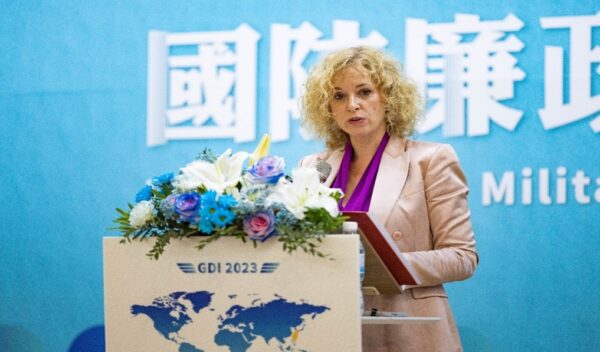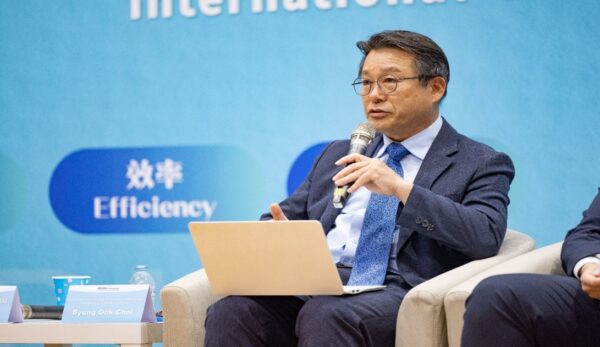Integrity is the cornerstone of peace and security, writes Yi Kang Choo. Amid the delicate security challenges currently facing Taiwan, we visited Taipei to share a roadmap for upholding integrity in military operations and procurement.
Hailed as the ‘integrity experts’ by Taiwanese media, a Transparency International Defence and Security (TI-DS) delegation led by Head of Advocacy Ara Marcen Naval was recently invited to deliver the keynote speech at the 2023 International Military Integrity Academic Forum in Taiwan. A packed week in Taipei, the capital, saw the team encourage and support countries in the Asia Pacific region to strategically address corruption risks in their national defence and security sectors.

Above: Leading the TI-DS delegation is Ara Marcen Naval, Head of Advocacy (left centre), along with Najla Dowson-Zeidan, Advocacy & Engagement Manager (3rd from the left), Yi Kang Choo, Programme Officer (1st from the left), and Prof. Byung-Ook Choi, Transparency International South Korea (4th from the left).
Corruption represents a critical national security threat in this geo-politically sensitive region
The audience included directors from the Ministry of National Defence Procurement Office, Department of Resource Planning, Division of Defence Strategy and Resources, as well as the Ministry of Justice and the Agency Against Corruption. Companies within the defence industry were invited on the second day of the Forum.

Above: Ara Marcen Naval, Head of Advocacy of TI-DS delivering keynote speech to attendees of the forum
Our delegation was hosted by Po Horng-Huei, Vice Minister of Defence (Policy) of Taiwan. We were joined by the Integrity Defence Committee in Transparency International Korea and members of Transparency International Taiwan.
Regional trends and corruption risks
As shown in our GDI index, while Taiwan generally scores highly on institutional resilience to corruption in defence, key defence sector corruption risks in Taiwan and across the Asia Pacific region reside within military operations. Corruption in operations undermines the power of deterrence.
When defence institutions lack integrity, deterrence strategies lose credibility. When neighbouring countries perceive a nation’s military as corrupt or compromised, they might view deterrence signals as less credible, potentially emboldening them to take more aggressive actions. Given Taiwan’s security ties to the stability of the region, any perception of corruption within Taiwan’s defence sector could potentially be exploited by adversaries seeking to undermine the credibility of its defence and weaken Taiwan’s position in the region. Moreover, such perception of corruption could incentivise aggressive behaviour by others, potentially leading to territorial expansion or military provocations, with the potential to destabilise the entire region.
Defence offsets: the mutual responsibility of defence companies and governments to operate with integrity
Countries across the world are developing and implementing new policies and strategies to strengthen their national defence manufacturing capabilities in response to elevated geo-political conflict, resource competition, and changing alliances.
Rather than focusing on boosting their defence manufacturing through direct grants and contracts with local defence companies, many countries are pursuing defence offsets – a form of industrial cooperation which involves foreign defence company investments in local defence or other economic sectors in exchange for securing arms deals with buying governments. The total value of defence offsets in Asia is expected to reach US$88 billion by 2025.
Countries in Asia and Oceania, both with developed and underdeveloped defence industries, are adopting defence offsets for various purposes. For example, Taiwan seeks to introduce high-tech industries, encouraging foreign investment, promoting exports, and improving industrial structure. Moreover, the facilitating role of industrial cooperation to the remarkable success in the semiconductor industry is widely acknowledged among policy makers in Taiwan.
However, this trend is not without its corruption risks.
Former government officials from across the region have highlighted “how offsets are susceptible to corruption within a sector where bribes can represent nearly twice the contract value of procurements in any other sector.” In India, the government has been investigating at least three corruption cases.
Some defence industry representatives have even cancelled contracts due to corruption concerns in offset related transactions. This form of corruption has hurt countries’ abilities to perform critical military missions, slowed growth in local defence industries, and eroded trust in government integrity.
Against this backdrop, the Transparency International Defence and Security delegation urged companies to publicly acknowledge the corruption risks associated with offset contracting and ensure that all offset partners and projects are subject to enhanced due diligence procedures. Defence companies should be transparent about any involvement in offset projects worldwide. Moreover, government officials and departments dealing with offset projects should enhance their oversight of key risk areas, including the use of wide-ranging multipliers to assess the value of proposed or completed offset projects, and the ability for defence companies to provide cash payments or working capital to any type of local company.

Above: Prof. Byung-Ook Choi, a member of the Integrity Defence Committee in Transparency International Korea speaking on stage, sharing his concerns and recommendations on offset policies to reduce corruption risks.
Another key area of risk within the region is corruption in the arms trade and defence procurement.
Global military expenditure in 2022 was $2.2 trillion – 3.7 per cent more than the previous year. China’s military spending rose last year for the 28th consecutive year, to reach $292 billion. Military spending in Taiwan is also rising, driven by concerns about regional security.
These increases in spending on defence, alongside the scale of corruption risk in the defence sectors of arms exporting and importing countries, brings increased risk of distorted defence spending priorities and military acquisitions, imbalances in the distribution of military capabilities, corruption-enabled arms diversion, and diminished military capability. Corruption in defence procurement can undermine the quality and reliability of military equipment and infrastructure, jeopardising the safety and operational effectiveness of armed forces during potentially critical situations.
To manage these risks, increases in defence spending must be accompanied by corresponding improvements in transparency and defence governance.

Above: Hybrid Regional Meeting between TI-DS with TI Chapter Representatives from Taiwan, South Korea, Malaysia, and Indonesia.
Looking ahead
Our visit to Taiwan exposed us to the dedicated efforts of the Taiwanese government to uphold transparency and integrity standards in their defence and security sectors. However, as is often the case in countries with high military expenditures and national security pressures, it remains possible for the full extent of the risk of corruption, or the perception thereof, to be overlooked. This risk has the potential to significantly impact a nation’s defence readiness and deterrence, Taiwan included.
Therefore, the need for continuous improvement is paramount. Addressing corruption risks within the defence sector is not an ethical obligation; it is a strategic imperative for Taiwan’s security, reputation, and stability. By actively working to eliminate corruption risks, Taiwan can continue to bolster its defence capabilities and contribute to regional stability, whilst at the same time setting an example for other countries in the region and beyond.
Proactive regional cooperation to promote defence integrity
In the margins of the Integrity Forum, we took the opportunity to convene and strengthen our alliances for more robust regional and global advocacy with Transparency International Chapter representatives in the region including South Korea, Malaysia, Indonesia, and Taiwan.
By aligning regional priorities and interests with our chapter colleagues, we eagerly anticipate more countries stepping up as champions against corruption within their national defence sectors, emulating Taiwan’s example and igniting a contagious movement of heightened integrity and security throughout the region. We’ll continue to emphasise that civil society organisations like Transparency International Defence and Security are allies in this ongoing, challenging, and profoundly important struggle to instil integrity in defence and security and create a safer world for all.
Yi Kang Choo is Programme Officer at Transparency International Defence and Security.

